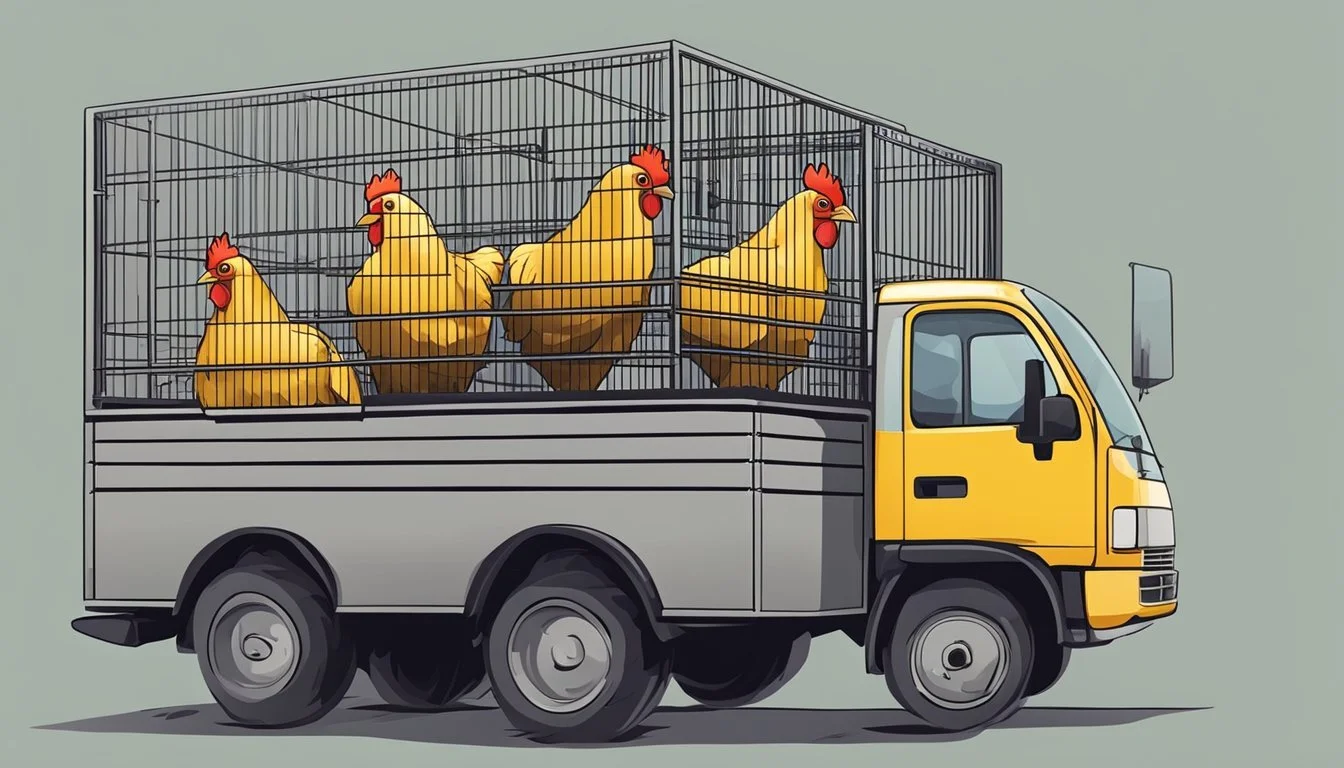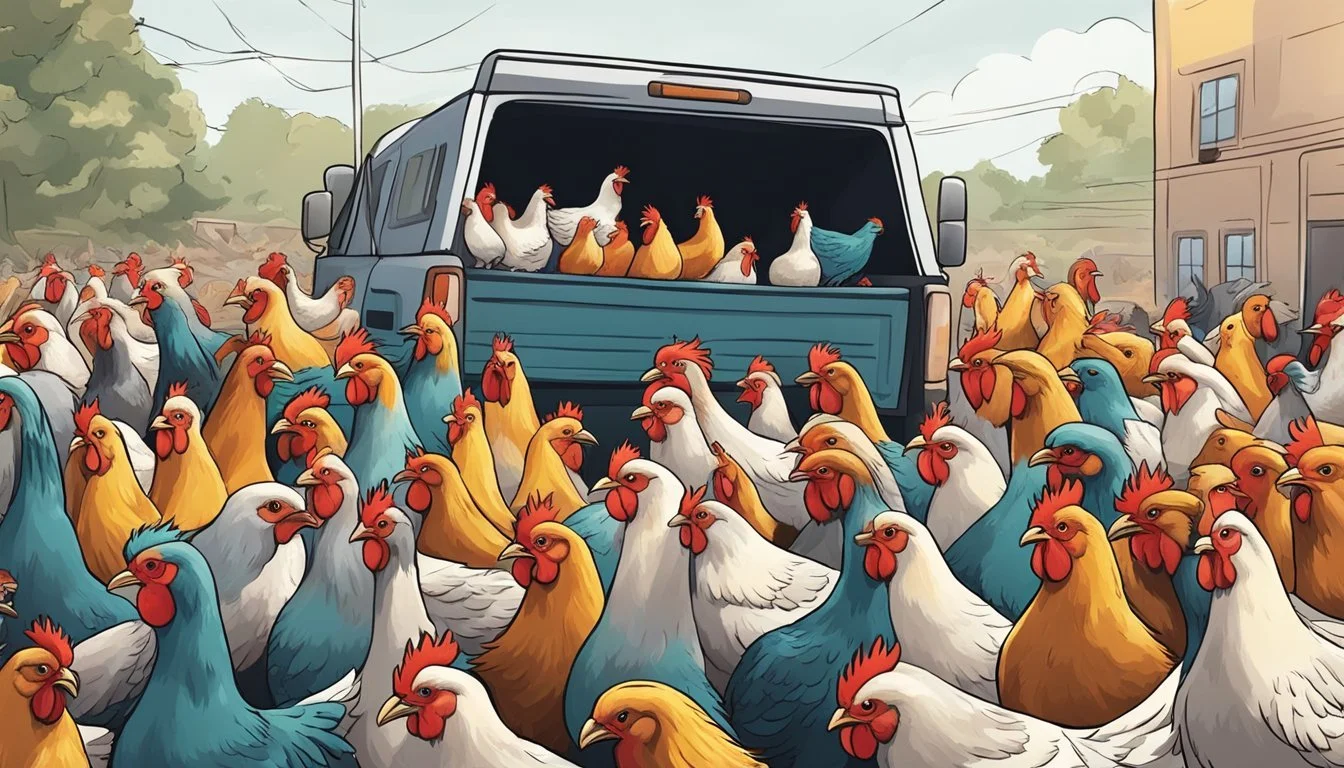How do I manage chicken stress during transportation?
Expert tips for a smooth journey
Managing chicken stress during transportation is a critical aspect of poultry farming that impacts both animal welfare and the quality of the end product. Stressful transportation can result in reduced meat quality, increased mortality rates, and a higher susceptibility to diseases among chickens. It is essential for farmers and poultry transporters to implement strategies that reduce stress in order to maintain the health and well-being of the birds throughout the journey.
To effectively manage chicken stress, an understanding of the stressors involved is necessary. Overcrowding, extreme temperatures, improper handling, and long duration without food or water are common factors that contribute to elevated stress levels. By addressing these issues, transporters can minimize the adverse effects on chickens. Proper crate conditions, such as adequate ventilation and space, along with the careful planning of routes to reduce travel time and avoid rough or noisy environments, play a vital role in mitigating stress.
Nutritional support before and after transportation can also help in managing stress levels in chickens. This may include providing easily digestible feed and access to water enhanced with electrolytes and vitamins before the trip. Employing these techniques ensures that the chickens arrive at their destination in optimal health, promoting a more productive and humane poultry industry.
Understanding Chicken Stress
Managing stress in poultry is crucial for the welfare and productivity of the birds. Recognizing the signs and understanding the causes of stress can lead to effective strategies for creating a more hospitable environment during transportation.
Physiological Symptoms of Stress
In chickens, stress manifests through various physiological symptoms which may include changes in respiratory rate, a decrease in food consumption, and a decline in egg production. Stress can also lead to an increase in adrenal gland size, indicating the release of stress hormones. These hormones are part of the chicken's fight or flight response which is triggered by the perception of a threat. Monitoring these physical signs is essential for early detection and management of stress levels.
Causes of Stress in Poultry
Transporting poultry can introduce multiple stressors that impact the birds' well-being. Stress in chickens during transportation can arise from loud noises, such as traffic or human activity, which can be disorienting and alarming for the animals. Bright lights are another stressor, as chickens are sensitive to changes in lighting, which can cause distress and disorientation. Moreover, the presence or perception of predators can induce panic and fear in a flock, elevating stress levels. To reduce poultry stress during transportation, it is imperative to understand and mitigate these causes effectively.
Pre-Transportation Preparation
Preparing chickens for transportation is crucial to manage stress and ensure their well-being throughout the journey. Attention to detail during the pre-transport phase can significantly impact their health and comfort.
Selecting the Right Chicken Crates
Choosing appropriate crates for chicken transportation is the first step to safeguard their safety and minimize stress. Crates should be sturdy yet have ample ventilation to prevent overheating and suffocation. It is essential to avoid overcrowding; typically, smaller crates designed to hold two or three chickens are recommended to restrict movement and provide a sense of security for the chickens during transit.
Nutrition and Hydration Prior to the Journey
Prior to the journey, ensuring optimal nutrition and hydration levels is necessary to combat stress. A diet enhanced with vitamins, minerals, amino acids, and probiotics can strengthen their physiological resilience. Adding non-medicated nutritional supplements to their feed can be beneficial.
Water: Offer fresh water laced with electrolytes to maintain hydration and balance electrolyte levels.
Food: Supplying food rich in energy and incorporating fermentation products in their diet helps to support their immune system prior to the stress of transport.
It is vital to prevent dehydration by providing continuous access to water, allowing chickens to embark on the journey in a hydrated state with all their nutritional needs met.
During Transportation
Transporting chickens in a manner that prioritizes their wellbeing requires careful management of their environment to mitigate stress. Special attention to ventilation, temperature, and minimizing disturbances is essential.
Ensuring Proper Ventilation and Temperature Control
Proper ventilation is crucial during transportation to supply fresh air and prevent overheating, which can protect chickens from distress. Transport crates must allow for adequate airflow while protecting the flock from extreme weather conditions. It is advisable to use a cloth covering to maintain a consistent internal temperature, ideally around 75℉, thereby fostering a healthy environment for the chickens.
Minimizing Disruptions and Turbulence
To ensure minimal stress, one must avoid sudden movements and disruptions. Smooth driving with gentle turns and avoidance of potholes reduces the turbulence chickens experience, making the transition easier for them. Properly securing crates in the vehicle can help to prevent them from shifting and adding to the agitation of the birds.
Maintaining a Calm Environment
A calm environment significantly reduces stress levels in chickens during transit. Utilizing dark boxes or covers can simulate nighttime, a naturally calming condition for chickens. Employing a stress management program also does well to prepare and maintain the serenity of the transported birds. Reducing exposure to loud noises and maintaining a quiet setting can make a substantial difference in the birds' stress levels.
Post-Transportation Care
After chickens are relocated, critical steps must be taken to ensure their smooth acclimation to the new environment and maintain their health and immunity. Proper care during this period can markedly minimize stress and promote recovery from the journey.
Acclimation to the New Environment
Once chickens arrive at the poultry farm, it is essential to introduce them to their new surroundings gradually. They should be placed in a controlled environment where temperature, humidity, and lighting are closely regulated to match the conditions they are accustomed to. This sensitive approach to acclimation helps reduce stress levels. It is beneficial to provide access to clean water and feed, which will further aid in making them comfortable and ensuring a seamless transition to their new habitat.
Monitoring Health and Immunity Post-Transfer
Post-transportation care involves vigilant monitoring of the chickens' health. Regular health checks should be conducted to identify any signs of illness or distress early on. A close eye on their behavior and physical appearance can serve as the first indicator of potential health issues. Immunity can be compromised after the stress of transfer; thus, administering non-medicated nutritional supplements like probiotics and vitamins can be an effective way to bolster their immune response during this critical period.
Advanced Stress Reduction Strategies
To effectively manage chicken stress during transport, it's essential to focus on nutritional interventions and breed resilience. These advanced strategies aim to maintain physiological balance and optimal production levels in poultry, despite the stresses of transportation.
Dietary Supplements and Probiotics
Introducing dietary supplements and probiotics before and during transportation can be a decisive factor in stress reduction. For instance, a balanced diet that includes amino acids, minerals, vitamins, and electrolytes ensures chickens have the nutritional reserves to cope with stress. Incorporating soothing herbs and healthy treats, such as fresh fruit, can also support a chickens' well-being. Probiotics, as well as fermentation products, help maintain gut health, which is closely tied to a chicken's immune system and can mitigate immune suppression caused by stress.
Creating a Stress-Resilient Flock
Focusing on the resilience of the flock involves breeding and managing chickens to withstand transportation stress. Providing flock blocks is an interactive food source that reduces pecking and boredom, leading to a calmer environment. Coupled with this, the inclusion of healthy treats in their diet not only provides for their nutritional needs but also offers mental stimulation. Selective breeding for characteristics such as calm temperament further contributes to creating a robust flock capable of maintaining production levels and physiological balance during stressful periods.
Transportation Equipment and Facilities
Effective chicken transport requires specific equipment and facilities designed to mitigate stress. The chosen systems need to balance confinement with comfort, offering stability while ensuring necessary airflow.
Design of Poultry Transportation Systems
Poultry transportation systems should prioritize secure yet comfortable confinement. Small poultry crates specifically designed to hold chickens play a critical role. These units are often constructed with breathing slots to maintain ample ventilation, which is crucial for the birds' well-being during transit. Additionally, a well-ventilated crate, possibly with the insulation of an insulated vehicle, can help regulate temperature and reduce risk of thermal stress.
For longer journeys, a suitable carrying container may include innovations like portable feeders and portable drinkers to supply sustenance without necessitating removal of the chickens. These features should be seamlessly integrated into the crates to minimize discomfort and disturbance.
Cleanliness and Maintenance of Transporting Equipment
Regular cleaning is a fundamental aspect of maintaining transporting equipment. Before each use, chicken crates should be thoroughly sanitized to prevent the spread of disease. A strict protocol might involve washing each crate with a disinfectant solution followed by a clear water rinse. After cleaning, laying clean bedding such as shavings within the crates provides a layer of comfort enhancing the chickens' grip and absorbing waste.
Replacing any bedding after each journey ensures that every group of chickens experiences a fresh, clean environment. Additionally, checking all containers for signs of damage and wear is essential; a carrying container in disrepair may lead to injury or escape. It is important that small crates and enclosures are also regularly inspected to ensure their structural integrity and the effectiveness of their secure locking mechanisms.
Practical Guidelines for Farmers
To ensure the well-being of poultry during transportation, farmers must prioritize effective stress management practices. These include the development of robust stress mitigation programs and careful evaluation of their impact on chicken health and production rates.
Developing a Comprehensive Stress Management Program
Farmers should create a stress management program tailored to the unique needs of their poultry farm. The program should address key stressors such as overcrowding and heat stress by establishing transport guidelines that minimize stress. Poultry Service Association's manual suggests the following:
Ventilation: Adequate airflow is crucial to prevent heat stress.
Spacing: Chickens require sufficient space to reduce overcrowding and related stress.
Handling: Gentle and competent handling can reduce stress levels significantly.
Evaluating Performance: Production Rates and Health
Transportation stress directly affects chickens' health and farm's production rates. Farmers can assess the success of their stress management program by monitoring post-transportation production rates and health indicators, such as weight loss or incidences of illness. Transport-related stress indicators from Poultry Performance Plus can inform farmers whether adjustments are needed:
Post-transport weight: Maintain detailed records to identify weight loss.
Health assessments: Regular health checks can detect early signs of stress-induced illness.
By implementing these guidelines, farmers can help ensure transportation processes are optimized for poultry welfare, leading to sustained production efficiency.




